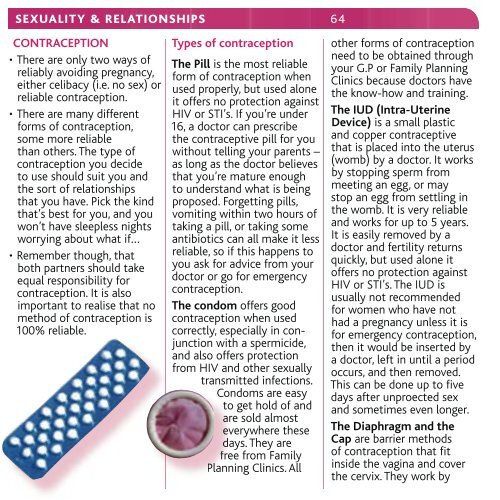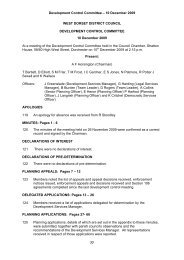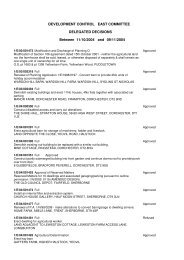The rough guide - Dorsetforyou.com
The rough guide - Dorsetforyou.com
The rough guide - Dorsetforyou.com
You also want an ePaper? Increase the reach of your titles
YUMPU automatically turns print PDFs into web optimized ePapers that Google loves.
SEXUALITY & RELATIONSHIPS 64<br />
CONTRACEPTION<br />
• <strong>The</strong>re are only two ways of<br />
reliably avoiding pregnancy,<br />
either celibacy (i.e. no sex) or<br />
reliable contraception.<br />
• <strong>The</strong>re are many different<br />
forms of contraception,<br />
some more reliable<br />
than others. <strong>The</strong> type of<br />
contraception you decide<br />
to use should suit you and<br />
the sort of relationships<br />
that you have. Pick the kind<br />
that’s best for you, and you<br />
won’t have sleepless nights<br />
worrying about what if…<br />
• Remember though, that<br />
both partners should take<br />
equal responsibility for<br />
contraception. It is also<br />
important to realise that no<br />
method of contraception is<br />
100% reliable.<br />
Types of contraception<br />
<strong>The</strong> Pill is the most reliable<br />
form of contraception when<br />
used properly, but used alone<br />
it offers no protection against<br />
HIV or STI’s. If you’re under<br />
16, a doctor can prescribe<br />
the contraceptive pill for you<br />
without telling your parents –<br />
as long as the doctor believes<br />
that you’re mature enough<br />
to understand what is being<br />
proposed. Forgetting pills,<br />
vomiting within two hours of<br />
taking a pill, or taking some<br />
antibiotics can all make it less<br />
reliable, so if this happens to<br />
you ask for advice from your<br />
doctor or go for emergency<br />
contraception.<br />
<strong>The</strong> condom offers good<br />
contraception when used<br />
correctly, especially in conjunction<br />
with a spermicide,<br />
and also offers protection<br />
from HIV and other sexually<br />
transmitted infections.<br />
Condoms are easy<br />
to get hold of and<br />
are sold almost<br />
everywhere these<br />
days. <strong>The</strong>y are<br />
free from Family<br />
Planning Clinics. All<br />
other forms of contraception<br />
need to be obtained th<strong>rough</strong><br />
your G.P or Family Planning<br />
Clinics because doctors have<br />
the know-how and training.<br />
<strong>The</strong> IUD (Intra-Uterine<br />
Device) is a small plastic<br />
and copper contraceptive<br />
that is placed into the uterus<br />
(womb) by a doctor. It works<br />
by stopping sperm from<br />
meeting an egg, or may<br />
stop an egg from settling in<br />
the womb. It is very reliable<br />
and works for up to 5 years.<br />
It is easily removed by a<br />
doctor and fertility returns<br />
quickly, but used alone it<br />
offers no protection against<br />
HIV or STI’s. <strong>The</strong> IUD is<br />
usually not re<strong>com</strong>mended<br />
for women who have not<br />
had a pregnancy unless it is<br />
for emergency contraception,<br />
then it would be inserted by<br />
a doctor, left in until a period<br />
occurs, and then removed.<br />
This can be done up to five<br />
days after unproected sex<br />
and sometimes even longer.<br />
<strong>The</strong> Diaphragm and the<br />
Cap are barrier methods<br />
of contraception that fit<br />
inside the vagina and cover<br />
the cervix. <strong>The</strong>y work by

















